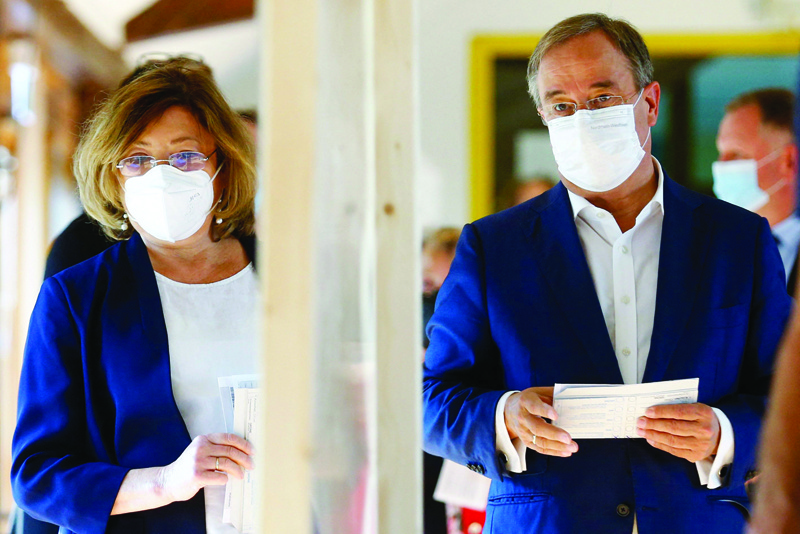 AACHEN: Germany's conservative Christian Democratic Union CDU leader and candidate for chancellor Armin Laschet and his wife Susanne Laschet arrive to cast their ballots at a polling station in Aachen yesterday. - AFP
AACHEN: Germany's conservative Christian Democratic Union CDU leader and candidate for chancellor Armin Laschet and his wife Susanne Laschet arrive to cast their ballots at a polling station in Aachen yesterday. - AFP
BERLIN: Germany was voting yesterday in one of the most unpredictable elections in its recent history, with Angela Merkel's conservatives and the centre-left Social Democrats in a tight race for her crown as she prepares to leave the political stage. The epochal election ushers in the end of 16 years in power for Merkel and places Germany, a byword for stability, in a new period of uncertainty.
Opinion polls show the race for the chancellery headed for a photo finish, with Merkel's CDU-CSU conservative alliance on around 23 percent, just behind the centre-left Social Democrats (SPD) on 25 percent-well within the margin of error. "We will certainly see some surprises," said Nico Siegel, head of the Infratest Dimap polling company. Despite the SPD's lead in the polls, a victory for the conservatives "can't be ruled out", he said. "The race for first place is wide open."
Polls opened at 0600 GMT and will close at 1600 GMT. Around 40 percent of Germany's 60.4 million eligible voters have said they are undecided, while the same proportion have already cast their ballots by post-including Merkel herself. President Frank-Walter Steinmeier was among the early voters yesterday, declaring that "to vote is to live democracy" as he cast his ballot in Berlin. The two men jostling for the top job-Finance Minister and Vice Chancellor Olaf Scholz, 63, of the SPD, and Armin Laschet, 60, of the CDU-CSU-voted in their respective hometowns of Potsdam and Aachen.
Laschet stressed that "every vote counts" in an election that would determine "the direction of Germany in the next years", while Scholz said he hoped the good weather was "a good sign" for his party. At a polling station in Aachen, voter Ursula Becker, 62, told AFP: "This year it's quite exciting who it will be, and it's always important who governs." In Berlin, Hagen Bartels, 64, said he was expecting "the surprise that the biggest party is not the SPD but probably the CDU".
Close contest
With both parties likely to fall well short of the majority needed to govern alone, there could be weeks or even months of fraught coalition negotiations. After Germany's last election in September 2017, it was February before the CDU-CSU formed a coalition with the SPD. Laschet, an affable but gaffe-prone centrist and longtime Merkel ally, was for some time the clear favorite. But his popularity began to wane after a series of blunders over the summer, including being caught on camera laughing in the background during a tribute to the victims of devastating floods in Germany.
In the meantime, Scholz, who at the start of the year had looked down and out in the race, saw his ratings begin to rise as he avoided making such embarrassing mistakes. Along with social justice, climate change has been one of the top concerns among voters in the run-up to the election. In Aachen, first-time voter Maite Hoppenz, 18, told AFP that climate change was "definitely a big topic for me because I think it will certainly have a big impact on my future". Benedikt Ruedesheim, 33, said he would have liked to see "a bit more clarity about who is planning what" on climate change as he cast his vote in Berlin.
Green wave that wasn't
The Green party enjoyed a surge in support earlier this year after naming 40-year-old Annalena Baerbock as its chancellor candidate, at one point even briefly taking the lead as the most popular party. But after a series of missteps by Baerbock, including a plagiarism scandal, the Greens are now polling well behind the two leading parties on around 17 percent. While the chancellery may be out of reach for the party, it will likely have a role in Germany's next government. All bets are off on the composition of the next coalition, as the SPD and the conservatives could each try to cobble together a ruling majority if there is little to divide their score.
On the eve of the polls, Scholz voiced his preference for a partnership with the Greens, calling on voters to give him the score needed to go with a two-way coalition. Laschet has signaled he could still try to form a coalition even if the CDU-CSU do not come first, most likely calling on the FDP and the Greens for support. But coming second would be a devastating blow for the party, which has dominated German politics since World War II and has never won less than 30 percent of the vote in federal elections. - AFP
.jpg)



